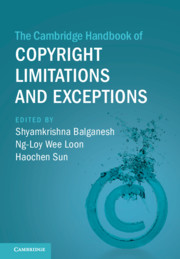Book contents
- The Cambridge Handbook of Copyright Limitations and Exceptions
- The Cambridge Handbook of Copyright Limitations and Exceptions
- Copyright page
- Contents
- Contributors
- Preface
- Part I The Theoretical Foundation of Copyright Limitations
- Part II Internationalizing Copyright Exceptions
- 3 Displacing the Dominance of the Three-Step Test: The Role of Global Mandatory Fair Use
- 4 An International Instrument on Permitted Uses in Copyright Law
- 5 A Copyright Limitations Treaty Based on the Marrakesh Model: Nightmare or Dream Come True?
- 6 Protection of Limitations and Exceptions in the International Copyright Framework
- Part III Models of Copyright Exceptions
- Part IV Obvious and Hidden Values in the Working of Copyright Exceptions
- Part V Copyright Exceptions and Technology
3 - Displacing the Dominance of the Three-Step Test: The Role of Global Mandatory Fair Use
from Part II - Internationalizing Copyright Exceptions
Published online by Cambridge University Press: 15 January 2021
- The Cambridge Handbook of Copyright Limitations and Exceptions
- The Cambridge Handbook of Copyright Limitations and Exceptions
- Copyright page
- Contents
- Contributors
- Preface
- Part I The Theoretical Foundation of Copyright Limitations
- Part II Internationalizing Copyright Exceptions
- 3 Displacing the Dominance of the Three-Step Test: The Role of Global Mandatory Fair Use
- 4 An International Instrument on Permitted Uses in Copyright Law
- 5 A Copyright Limitations Treaty Based on the Marrakesh Model: Nightmare or Dream Come True?
- 6 Protection of Limitations and Exceptions in the International Copyright Framework
- Part III Models of Copyright Exceptions
- Part IV Obvious and Hidden Values in the Working of Copyright Exceptions
- Part V Copyright Exceptions and Technology
Summary
Article 10(1) of the Berne Convention mandates a quotation exception that is broad in scope, one that is not limited by work, nor type of act, nor by purpose, and is only subject to the conditions in Article 10, namely, the work has been lawfully made available to the public, attribution, fair practice, and proportionality. We call this “global mandatory fair use.” This overlooked norm in international copyright law is unaffected by and distinct from the three-step test and, as such, potentially dislodges its dominance. In turn, this creates different possibilities for how to conceive of and assess copyright exceptions at the national level. To substantiate our argument, this chapter is structured in three parts.outlines our underpinning contention, namely, that Article 10(1) creates a global mandatory “fair use” type obligation.explains why this obligation is unaffected by the three-step test in international copyright law. Finally, in , we draw out the differences between Article 10(1) and the three-step test and illustrate the potential relevance of this for national law using the specific case of US “fair use.”
- Type
- Chapter
- Information
- Publisher: Cambridge University PressPrint publication year: 2021
- 1
- Cited by



